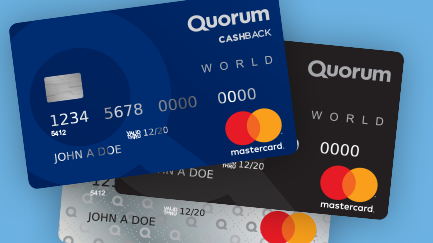Shopping for a credit card? When used responsibly, credit cards offer a convenient, flexible way to make purchases, can help you build credit, and almost always offer desirable incentives like cash back, rewards, and other valuable perks. With so many offers out there with unique features, it’s important to understand the “credit card lingo” to better compare offers. Below are some key terms and tips to help you find the best credit card for you.
Know What Factors to Compare
When comparing credit cards, read the fine print and take the following factors into account to help find the perfect card for your lifestyle, budget and spending habits:
- Annual Percentage Rate (APR): The APR is the interest rate you pay on your credit card purchases (generally, you can avoid paying interest on purchases if you pay your balance in full each month by the due date). The APR advertised is normally a range, with your final rate determined based on your creditworthiness (so you may not learn your card’s specific rate until your application has been reviewed and approved). When comparing offers, be sure to determine if you are looking at the card’s APR, or the introductory APR. The introductory rate, usually offered for around six months or so, can be much lower than the regular APR (even 0%). Once this period expires, interest accumulates on your account’s balance at the regular APR.
- Penalty APR: When you fail to pay your bill on time, financial institutions may shift your interest rate to a much higher “penalty APR.” Understand what could potentially trigger a penalty APR (for instance, how many days do you have to be late on a payment, what is the penalty rate, how long do you have to pay it, and does it apply to current balances and/or future balances). Avoid this penalty by monitoring your credit card balances closely and set calendar reminders to keep track of payment due dates.
- APR for balance transfers: If you are switching your credit card debt from one card to another with more favorable rates and terms (a balance transfer), understand what your rate will be after the introductory period (if you don’t plan on paying the balance off before this period is over).
- Fees: Familiarize yourself with any and all fees that you may incur for using your credit card. What fees are charged for cash advances, late payments, balance transfers, foreign transactions, etc.? Is there an annual fee associated with your card? If so, will the benefits you receive from the card outweigh the cost of the annual fee? Are the perks significant enough to warrant paying a fee each year?
- Perks and rewards: Make sure you weigh all of the perks and rewards you could receive for using your card. Decide what’s most important to you (Cash back? Experiences? A low APR on purchases?). Look for the card that helps you reach your financial goals faster. If the card is a rewards-based program, be sure you understand how reward redemption works, if rewards points expire, if you need to actively enroll in the program, and if there are any promotions you must take action on month to month or quarterly in order to qualify. Be sure you also review some of the lesser-advertised perks, which can be found in a card’s guide to benefits.
Understand How Your Credit Score Affects Your Options
Have you checked your free annual credit report lately? This report, along with your credit score, helps a financial institution determine the level of risk they assume when lending you money. Your current debt balances and history of on-time or delinquent payments heavily influence these scores which can range from a low of 350 to a maximum of 850.
It pays to know your score before applying for a credit card because it could affect your eligibility for specific promotions and account types. Typically, higher credit scores, such as an excellent score in the 750 and above range, allow you to qualify for cards with the best perks, lowest APRs and most enticing reward opportunities.
For more information about your credit score, click here.
Consider the Actual Cost of Sign-Up Bonuses
Many financial institutions (and department stores) offer credit card sign-up bonuses ranging from cash, to a percentage off of an initial purchase, to flight miles. Although these special offers may sound attractive initially, remember to weigh the overall benefit of the card. Are you signing up just for the bonus, or is it truly the card for you? Remember that for every credit card you open, your credit score takes a slight ding because opening the card requires a credit inquiry, which always lowers your score. The amount won’t do any real damage, and your score will recover after a few months, but if you are planning on making a major purchase by taking out a loan during that time, the hit to your score could force you to pay a higher interest rate.
Understand How to Handle Fraud and Accounting Errors
Have you read your credit card’s policy for handling fraudulent charges or accounting errors? Under federal law (The Fair Credit Billing Act), you have rights as a consumer. You may dispute erroneous charges to your card, unsatisfactory goods and services, and unauthorized charges. Also, if your card is stolen or used by an unauthorized individual, you may only be responsible for up to $50 of the total fraudulent charges, provided it is reported in a timely fashion. If fraudulent charges occur using just the card’s numbers, not the card itself, you may not be responsible for any portion of the charged amount.
Know How To Use Your Card Responsibly
Credit cards offer a myriad of benefits for consumers but are not without risk if managed irresponsibly. Understand the penalties, fees, and impact to your credit score that can come when you fail to pay your credit card statement on time. Also understand how long it will take you to pay off your balance should you only pay the minimum payment due each statement. When possible, pay more than the minimum balance, or the balance in full. Monitor your statement for overspending, and always be vigilant for any suspicious activity.








Comments Section
Please note: Comments are not monitored for member servicing inquiries and will not be published. If you have a question or comment about a Quorum product or account, please visit quorumfcu.org to submit a query with our Member Service Team. Thank you.